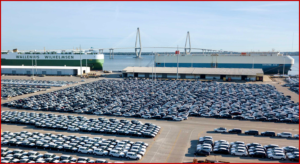Forget Trump’s wrong assertion [lie?] that trade is a zero-sum game and failed trade war,* BMW Manufacturing led the US in automotive exports by value for the eighth consecutive year, according to the U.S. Department of Commerce. During 2021, BMW Plant Spartanburg exported 257,876 BMWs with a total export value of more than $10.1 billion.
The BMWs produced in Spartanburg, South Carolina, were exported to about 120 countries primarily through the Port of Charleston, SC (nearly 219,000 units), through five additional southeastern ports and by rail to Canada. The top five export countries from BMW Manufacturing were China (24.1% of export volume), Germany (12.3%), South Korea (9.4%), Canada (5.6%), and Great Britain (5.4%).
“Free trade and open markets are essential for global businesses and economies to grow. It is the reason BMW and South Carolina have been successful,” said Milan Nedeljković, member of the Board of Management of BMW AG responsible for Production. “Plant Spartanburg contributes greatly to the success of the BMW Group. They are the center of competence for our X family of vehicles. They have world-class people who build world-class products. I congratulate our 11,000 associates for this achievement, and I thank our partners throughout South Carolina for their outstanding support,” Nedeljković said.
In 2021, BMW Manufacturing set a new production record with 433,810 BMW X vehicles produced. From that number, 179,840 X vehicles were sold in the United States, making up 53.4% of all BMW brand sales. The top two BMW models sold in America were the BMW X3 and BMW X5.
Since 1992, BMW Group has invested ~$12 billion in its South Carolina factory. BMW Manufacturing is the largest BMW Group plant in the world, producing more than 1500 vehicles a day. The model portfolio includes five top-selling BMW X models, four Motorsport X models, and two plug-in hybrid electric vehicle X models. The factory has a production capacity of up to 450,000 vehicles and employs more than 11,000 people.
AutoInformed.com on
- BMW Largest US Automotive Exporter for 7th Consecutive Year
- BMW Manufacturing Largest US Auto Exporter Again
- Largest US Auto Exporter – BMW Manufacturing
- BMW Group Threatens Trump on US Jobs
- Showroom Crossover Crowding First BMW X7 SUV
- BMW Opens Health Center at its South Carolina SUV Plant
- BMW to Spend $900 Million on South Carolina Plant for New X4
- MAMA Finalists for Family Vehicle of the Year Awards
- Canada Frozen Out of United States-Mexico Trade Agreement
- Trump versus Auto Industry – Outcome Could be Ugly
* see economist Paul Krugman click here.



The global automotive industry has faced significant challenges and disruptions over the past two years, with the first and still prevalent disruption being the COVID-19 pandemic. Attributable to the pandemic, a widespread chip shortage continues to wreak havoc on automotive, among many others, in addition to considerable labor shortages and rising material prices. Still faced with these crises’, automakers, suppliers, workers, and customers were met yet again with another supply chain disruption caused by protests against Canada COVID-19 mandates, which temporarily halted passage through the Detroit-Windsor Ambassador bridge.
The ongoing protests primarily surrounded the Canadian capital over the last month, which eventually led to protestors shutting down bridge traffic for nearly a week. The Ambassador bridge accounts for approximately 30% of all trade between the U.S. and Canada, with an estimated $325 million worth of goods transported each day. Nearly $100 million of that $325 million is comprised of automotive parts. As a result, automakers on both sides of the border were forced to shut down production or adjust production shifts temporarily.
Canadian plants were notably more affected by the shutdown as many could not receive just-in-time parts from the U.S. Many plants near the border have resumed production, and the bridge has since reopened. Still, the economic impact of the closure is expected to spread further into both countries. Plants closer to the border will receive delayed parts sooner, while plants further afield will experience shipping delays and potentially more downtime.
Industry experts have highlighted that such acute disruptions could be addressed with overtime to recoup lost production in a typical year; however, the bridge shutdown has considerably exacerbated the existing supply chain crises the auto industry is challenged with. CAR analysts expect the impact to be more significant on suppliers than automakers. While automakers have the advantage of focusing on high-transaction values in their production, volume-based production used by suppliers has left them vulnerable in managing such supply chain disruptions.
Industry analysts have also used this disruption to draw attention to the fragility of the North American supply chain and anticipate some automakers to re-consider sourcing more parts locally. The risk management involved in outsourcing is critical and noticeably difficult, as many have noted that human behavior such as the bridge protest is unpredictable. Canadian protestors remain in Ottawa, and similar COVID-19 mandate protests have appeared in France, with many left wondering how the impact on the supply chain might persist.